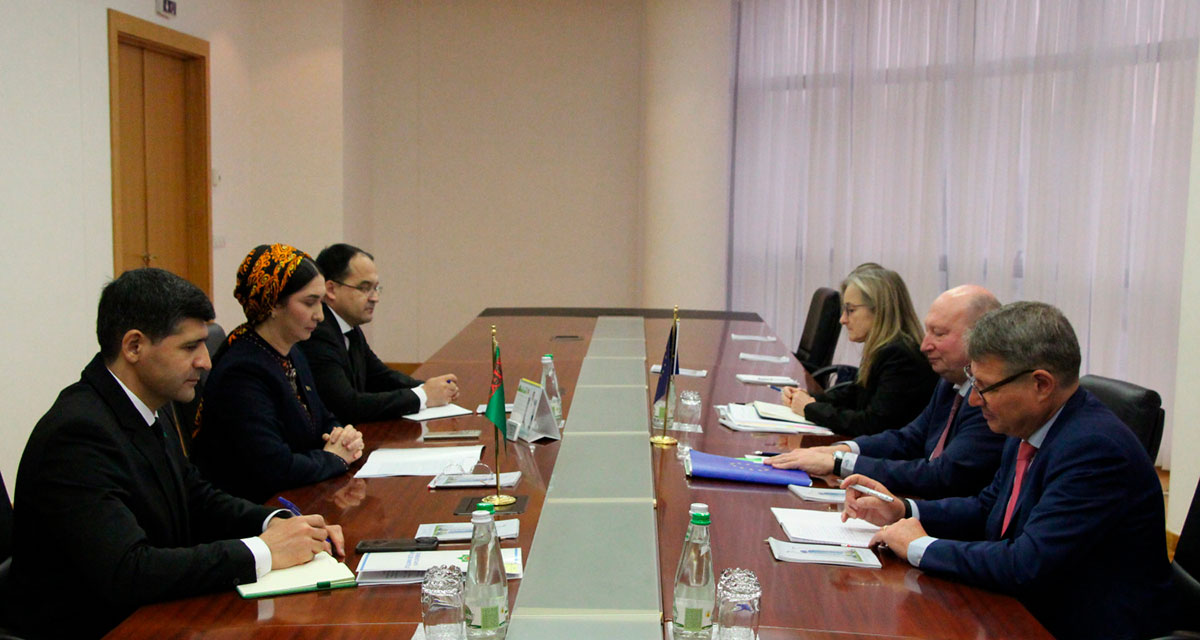The meeting of authorized representatives of the Caspian Sea littoral states has ended in the Turkmen capital. It was co-organized by the Ministry of Foreign Affairs, Ministry of Finance and Economy, and State Enterprise on the Caspian Sea Issues under the President of Turkmenistan.
Now in its fourth year, the meeting of experts from Azerbaijan, Iran, Kazakhstan, Russia, and Turkmenistan was held to finalize a draft Agreement on Trade-Economic Cooperation between the five Caspian Sea littoral states. The document had been prepared by Turkmenistan in line with President Gurbanguly Berdimuhamedov’s initiatives announced at the 4th Caspian Summit in the city of Astrakhan (Russian Federation) in September 2014.
Summing up the two-day meeting, its participants stated with satisfaction that regular consultations had enabled to significantly accelerate the creation of the pentalateral legal framework, which also includes sectoral agreements. Successful efforts are being made to work out a draft Agreement on Transport Cooperation between the Caspian Sea littoral states. The parties discussed the Agreement-related issues at yesterday’s meeting.
The Caspian Region has enormous economic potential and all the littoral countries will equally benefit from its realization. Constructive discussions on the Agreement on Trade-Economic Cooperation, and proposals made at the meeting indicate that the parties are willing to actively collaborate in this area, raise the effective collaboration to yet a higher and qualitatively new level, and give special meaning to it.
The draft document largely focuses on the legal and organizational mechanisms that will provide a platform for establishing an efficient dialogue between the littoral countries’ government agencies and business communities. On the whole, this will enhance the mutually advantageous trade-economic ties, boost trade turnover and the region’s investment attractiveness, as well as facilitate regional and interregional economic integration.
Now in its fourth year, the meeting of experts from Azerbaijan, Iran, Kazakhstan, Russia, and Turkmenistan was held to finalize a draft Agreement on Trade-Economic Cooperation between the five Caspian Sea littoral states. The document had been prepared by Turkmenistan in line with President Gurbanguly Berdimuhamedov’s initiatives announced at the 4th Caspian Summit in the city of Astrakhan (Russian Federation) in September 2014.
Summing up the two-day meeting, its participants stated with satisfaction that regular consultations had enabled to significantly accelerate the creation of the pentalateral legal framework, which also includes sectoral agreements. Successful efforts are being made to work out a draft Agreement on Transport Cooperation between the Caspian Sea littoral states. The parties discussed the Agreement-related issues at yesterday’s meeting.
The Caspian Region has enormous economic potential and all the littoral countries will equally benefit from its realization. Constructive discussions on the Agreement on Trade-Economic Cooperation, and proposals made at the meeting indicate that the parties are willing to actively collaborate in this area, raise the effective collaboration to yet a higher and qualitatively new level, and give special meaning to it.
The draft document largely focuses on the legal and organizational mechanisms that will provide a platform for establishing an efficient dialogue between the littoral countries’ government agencies and business communities. On the whole, this will enhance the mutually advantageous trade-economic ties, boost trade turnover and the region’s investment attractiveness, as well as facilitate regional and interregional economic integration.






